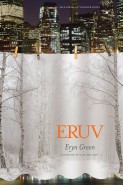
Book Review: Eruv by Eryn Green
Eruv
Poems By Eryn Green
Yale University Press, April 2014
ISBN-13: 978-0300201222
$18.00; 96 pp.
Reviewed by Ryan Boyd
Eryn Green’s debut, Eruv, won the 2013 Yale Younger Poets prize. This is entirely defensible, because at their sharpest these poems are thrilling fragments of experience, their speakers charged and vivid—people with a taste for the granular wonders that most lives (even painful ones) occasionally contain, and able to relay these to a reader. Green can evoke stations of consciousness, especially in response to nature (the “Big-toothed maple” in “First Walk”) and notionally urban spaces: “bravery is / a girl in the park who could not look brighter,” remarks the speaker of “Here to Spread Light On,” while the presence behind “Botanica” observes the
flashbulb
of a crowd as they pass by
my window, bicycle
noise cross-hatching
the night sky[.]
In the poems that work, you find yourself listening, it seems, to actual persons, even if those men and women are somewhat muddled. See these lines from “Dear Beings I Can Feel Your Hands”:
Thin series of blurs
like I was never there at all
Like the other day I heard a woman
talking to her friend at the bar I feel
like I’m not good enough. I’ll never make money
again, never fall in love. I don’t know
where to go when the doors close— (his italics).
But Eruv is ultimately unsatisfying, because most of the time the initial suggestiveness of its texts doesn’t coalesce into much. There are plenty of hot lines—“That electrician in your neck,” “that / money kind of confidence,” and “some arena of / song, pushed through the radio” are all from one poem, “Adumbrations.” There is plenty of raw data. But there is little indication of how to start making sense of it—what is being adumbrated? In his introduction to Eruv, Carl Phillips, who chose the book for the Yale prize, argues that its constituent texts “eschew an easy discursiveness” in favor of a “wildly associative” vibe. It is a tack that many poets (e.g. Stein, Ashbery, Hart Crane in parts of The Bridge, Neruda) have explored; and anyone who wants a poem to proffer a tidy message or instructive story is being foolish. Readers need to do some lifting when it comes to a serious text. That said, a writer needs to meet the reader halfway, giving some sense that the poem is delivering (perhaps even clarifying) intelligible human events: for all the genetic differences between their jobs, poets and novelists should both depict reasonably coherent lived environments if they want anyone to pay much attention to their work. Many poems in Eruv are gratuitously opaque, and I say this as someone who rides for Wallace Stevens and Kool Keith. For example, in “Anglers (So Soon)” the speaker rhapsodizes unhelpfully about “Your tongue that sits / astride numerous / fresh with / grove significance / shot through with / what comes to you / wastrel or champion / heart thing” [.] It goes on from there.
Green will write more rewarding books, ones that hopefully remain strange without making Eruv’s mistake of being too interested in their own depths to convey these to the audience. A prefatory note explains the book’s title, so why can’t the poems do a little in the same spirit? You might start the reader with “Huh?” You probably shouldn’t leave her there.
Ryan Boyd (@ryanaboyd) lives in Los Angeles. You can read more of his stuff at www.thegeneralreader.com.

